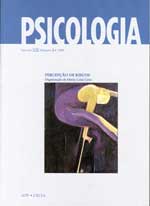Factores cognitivos associados a comportamentos de prevenção face a cheias (provocadas pelo rebentamento de barragens)
DOI:
https://doi.org/10.17575/rpsicol.v12i1.571Palavras-chave:
-Resumo
Segundo a teoria da adaptação cognitiva (Taylor, 1983, 1989) face a uma situação de ameaça, as pessoas desenvolvem ilusões de modo a manterem-se mentalmente saudáveis. Por outro lado, o modelo desenvolvido por Bandura (1977,1989) sugere que a crença específica de que se pode realizar um comportamento aumenta a probabilidade de se efetivar o mesmo. O estudo apresentado neste artigo foi desenvolvido com o objetivo de compreender a utilização destes mecanismos cognitivos na prevenção de cheias provocadas pelo rebentamento de barragens. Foram formuladas duas hipóteses principais: 1) os indivíduos que residem numa zona de maior risco desenvolvem uma maior subestima da ameaça e apresentam ilusões positivas; 2) os indivíduos que acreditam que podem realizar comportamentos de prevenção e simultaneamente acreditam na eficácia desses comportamentos serão aqueles que efetuam um maior número de ações de prevenção. Foram inquiridos 91 indivíduos de ambos os sexos habitantes de Silves, cidade que se situa a aproximadamente 15 quilómetros de duas barragens. Os resultados apoiam as hipóteses colocadas e são analisadas as suas implicações para a realização de ações de prevenção nesta localidade.


